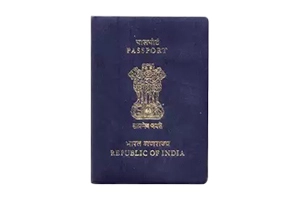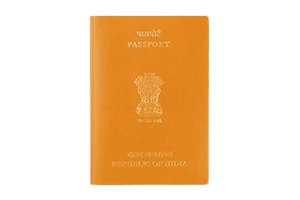Types of Passports in India
The Ministry of External Affairs of the Republic of India is responsible for issuing a passport to the citizens of India. According to the Passports Act of 1967,a passport allows the individual who holds it to travel abroad and serves as an official travel document issued by the Government of India.
There are various types of Indian passports, and each one has its respective significance. These passports are issued to individuals depending on their occupation.
Various Types of Indian Passports
The different types of passports in India are as follows:
Ordinary Passport

Regular Indian nationals who want to travel abroad for either business or leisure are issued a common passport, which is also referred to as passport type P. These passports are navy blue in colour and are issued for business trips, vacations, and educational trips.
Therefore, many Indians hold this passport. Its primary goal is to assist foreign authorities in distinguishing between ordinary citizens and government officials.
The blue colour makes it easier to determine the official status of a visitor. Such passports include the traveller's name, date of birth, and photograph, and other essential personal details required for immigration and international travel. These passports follow standard and modern design.
White Passport

A white passport is issued to individuals working for the Government of India who are travelling abroad on official duty. This passport is classified as passport of ‘Type S,’ where S indicates service.
The application process for this passport is different from that of a standard blue passport. Holders of a white passport are granted certain official facilitation benefits during travel; however, it does not override immigration laws or visa requirements of foreign countries.
Diplomatic Passport

A diplomatic passport is issued to diplomats and senior government officials representing India abroad on diplomatic assignments.
These passports have a maroon cover and are issued to individuals such as diplomats, Members of Parliament, and senior government officials. It is critical to know the difference between maroon and white passports.
Diplomatic passports are issued to any government representative planning an international trip who does not already have a white passport. They are designated for those working for the Indian Administrative Services and the Indian Police Service.
Maron passport holders get a host of benefits during their travel. One of the main advantages is that they do not require a visa when travelling abroad.
However, visa-free travel is subject to bilateral agreements, and in some cases, diplomatic passports holders may still require visas depending on the destination country and duration of stay.
Orange Passport

The passports issued to Indian nationals underwent significant changes in 2018. The government announced the discontinuation of printing the address page on Indian passports and introduced orange-coloured passports.
In terms of appearance, the proposed orange passport was intended to have a redesigned layout with simplified pages. The initiative was announced as part of efforts to improve the emigration process and protect vulnerable workers travelling abroad.
However, it is important to note that the orange passport scheme was later withdrawn following public feedback and concerns related to privacy and discrimination. As a result, orange passports are not currently issued in India.
The original proposal was meant for individuals falling under the Emigration Check Required (ECR) category, not specifically based on educational qualifications alone. The objective was to help immigration authorities easily identify ECR passport holders and ensure additional safeguards against exploitation, especially for those travelling overseas for employment.
Under the proposed system, certain personal details such as the traveller’s address were to be omitted from the passport to enhance privacy. Even today, ECR passport holders are required to follow specific emigration and immigration rules, including obtaining clearance from the Protector of Emigrants when travelling to certain countries for work.
Difference Between Various Types of Passports in India
Passport Colour | Purpose | Eligibility |
Blue (Ordinary/ Type P) | Travel abroad for business, tourism, education. | Regular Indian citizens. |
White (Service /Type S) | Official government work abroad. | Indian government employees traveling on official duty. |
Maroon (Diplomatic/ Type D) | Diplomacy, official government work, and visa free privileges. | Diplomats and senior government officials. |
Orange (ECR) | Identify less educated travellers for safe overseas employment. | Indian citizens with education less than or equal to 10th standard (proposed but not fully implemented). |
Yellow (Identity Certificate) | Travel document for stateless persons, refugee status. | Tibetan refugees and certain stateless residents in India. |
Tatkal (Fast-track ordinary passport) | Quick processing for urgent travel. | Indian citizens needing urgent passports. |
Benefits and Uses of Different Types of Indian Passports
The benefits of having an Indian passport are listed below:
- The identity of the passport holder's citizenship is generally determined by their passport.
- It serves as proof of identity and nationality and may also be accepted as proof of residence in certain cases.
- The passport holder's international travel information is recorded here.
- Access to several countries and territories without a visa or with visa-on-arrival depending on the destination and prevailing international agreements.
- You are eligible for a range of international internships and exchange programmes.
- While travelling internationally, you can ask for consular assistance from Indian embassies and consulates.
- For a temporary stay in a foreign country, a visa is issued and stamped in the passport book.
FAQs on Types of Passports in India
- Which type of Indian passport is the most common?
The blue passport also referred to as a ‘regular’ or ‘tourist’ passport is the most common type of passport issued in India.
- Is the application fee different for different types of passports in India?
No, the fee differs based on the type of passport service you choose, and only between regular and Tatkal service.
- What is a yellow Indian passport?
The yellow passport or Certificate of Identity is issued to Tibetan refugees and some other non-citizens residing in India who are not Indian citizens. It acts as a travel document and identity proof for international travel but does not confer Indian citizenship.
- Why was the orange passport not implemented in India?
The idea of orange passport was proposed by Indian government in 2018 to simplify emigration process and protect vulnerable workers travelling abroad. However, the idea faced a lot of backlashes due to concerns over privacy, discrimination, and social stigma.
- How much time does it take to obtain an Indian passport?
If you have submitted the required paperwork and followed the right steps, you will receive your passport in 30 to 45 days. Tatkal passports or emergency passports can be issued in two to three days.
- Which type of passport is issued to IAS officers?
The maroon diplomatic passport is granted solely to IAS officers who are assigned a diplomatic mission abroad.

Disclaimer
Credit Card:
Credit Score:
Personal Loan:
Home Loan:
Fixed Deposit:
Copyright © 2026 BankBazaar.com.
